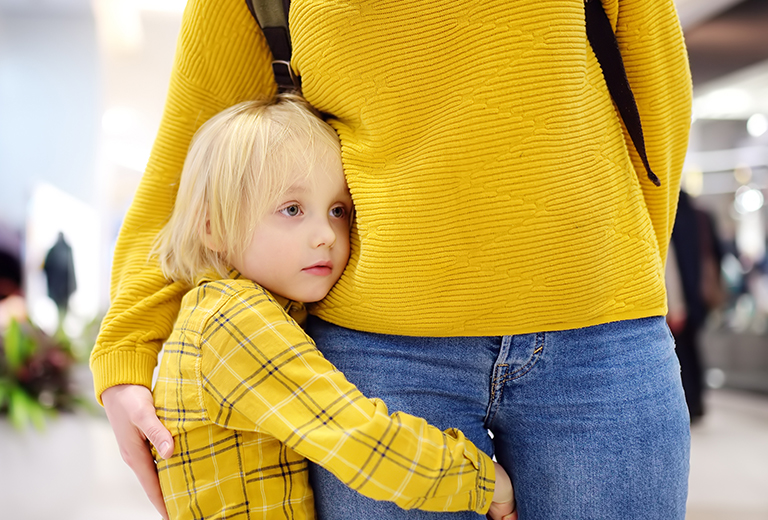Table of Contents
 Does your baby cry when you leave the room? Does your preschooler have meltdowns at childcare drop-off? Separation anxiety is normal for babies, toddlers, and preschoolers. But if it’s intense or prolonged, it can prevent your child from gaining independence and exploring social situations. It can also make transitions to childcare and school settings challenging for families. Fortunately, there are steps you can take to help your child deal with separation anxiety. Your pediatrician is an excellent resource if you feel separation anxiety is becoming a problem.
Does your baby cry when you leave the room? Does your preschooler have meltdowns at childcare drop-off? Separation anxiety is normal for babies, toddlers, and preschoolers. But if it’s intense or prolonged, it can prevent your child from gaining independence and exploring social situations. It can also make transitions to childcare and school settings challenging for families. Fortunately, there are steps you can take to help your child deal with separation anxiety. Your pediatrician is an excellent resource if you feel separation anxiety is becoming a problem.
What Is Separation Anxiety?
Separation anxiety happens when your baby becomes aware of “object permanence.” Object permanence is a psychological concept that means we realize that objects (or people) exist even when we can’t see them. So when your baby starts to notice when you leave the room, she may cry when you’re out of sight. Babies often become aware of object permanence around nine months, but it can happen as early as five months. Another separation anxiety milestone happens when babies hit the 15 to 18-month mark. Your toddler is becoming more independent and breaks away from you but may also cling and seek reassurance. Separations may result in tantrums during the toddler years.
Separation anxiety can resurface in preschool when many children get dropped off at school or childcare. Preschool children have a growing awareness of their ability to affect their parents’ behavior and may use crying, pleading, or tantrums to prevent parents from leaving them.
When Should I Worry About Separation Anxiety?
Most children outgrow separation anxiety by the time they’re 3. They begin to experience a sense of security with the understanding that their caregiver will come back. In most cases, separation anxiety is a normal and temporary developmental phase. We often see it manifest as children adjust to new settings and situations. If separation anxiety is overly intense or long-lasting, it may interfere with children’s developing independence and ability to function in a social environment. If not addressed, prolonged separation anxiety can turn into an anxiety disorder or panic disorder, which can cause excessive worry, refusal to be away from home, nightmares, and other issues. Your pediatrician is an excellent resource for finding constructive ways to address it before it gets worse.
How Can I Help My Child With Separation Anxiety
Separation anxiety can be stressful for parents, especially in a childcare or school setting. When you drop off your child and they plead or cry, it can create feelings of guilt and lead to second-guessing your decisions. The American Academy of Pediatrics offers several tips for addressing separation anxiety:
- Don’t linger. Make your goodbye rituals short and sweet.
- Be consistent. Maintaining a routine can give your child a sense of security and reaffirm that you always return just as you promise.
- Give your child your complete attention and plenty of affection before you leave, then say goodbye quickly.
- Resist the urge to make an unexpected return or check-in. It can cause more significant stress and disrupt the reassurance of routine.
- Be specific about when you’ll return, and do your best to stick to your commitment.
- Practice being apart before more significant transitions like childcare or preschool. Use short playdates without parents and visits to family members and friends to get used to spending time apart in gentle ways that ease your child into longer separations.
How Can My Pediatrician Help With Separation Anxiety?
If separation anxiety starts to interfere with your child’s ability to function, it’s time to talk with your pediatrician. Early diagnosis can help prevent separation anxiety from becoming an anxiety disorder. We can offer strategies for parents and children to ease transitions and create routines that reduce worry. If separation anxiety persists or gets worse, we can provide a referral to a mental health professional while continuing to provide support. The team at Loudoun Pediatric Associates can help you distinguish normal separation anxiety from a potentially more severe disorder. Our providers are here to support you, relieving stress on family dynamics and helping your child to thrive.







